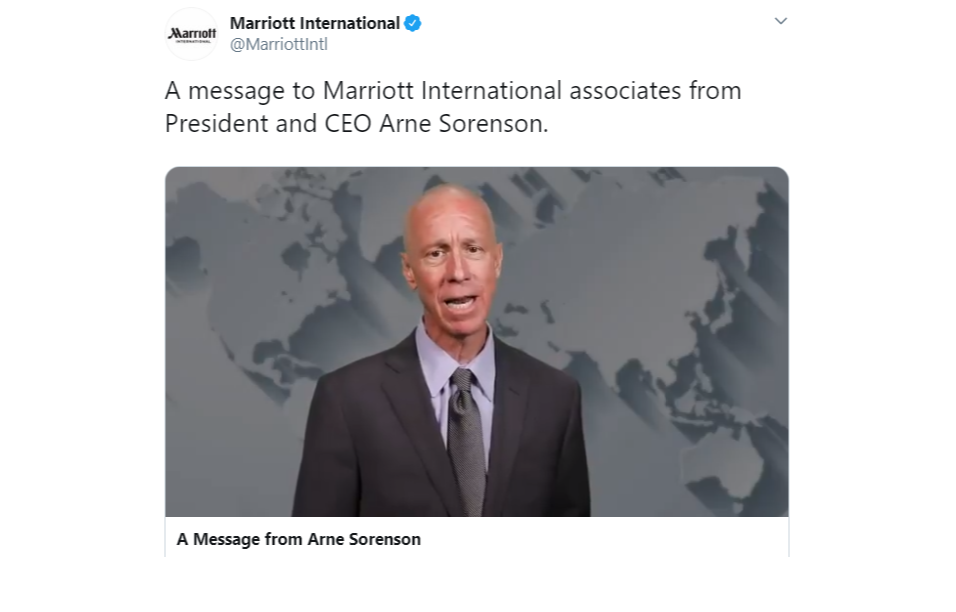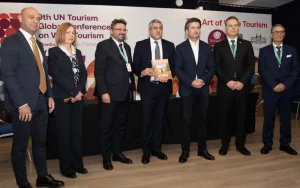In the wake of news that Marriott International was closing hotels and furloughing workers due to the novel coronavirus outbreak, the company is taking steps to support hotel owners and to prepare for the end of the crisis.
“The coronavirus or COVID-19 is fast becoming the most significant event to ever impact our business,” President/CEO Arne Sorenson said in an earnings call with investors. “That includes the 12-month period after 9/11 and the financial crisis of 2009.” In Q4 2001, following the September 11 terrorist attacks on the United States, he recalled revenue per available room fell roughly 24 percent. “The circumstance we’ve got today [is] worse than that because we’ve got RevPAR which is, at the moment, running down substantially lower than those numbers.”
The year had begun with a “solid start,” with global RevPAR growth in January and February down 0.3 percent year over year worldwide and up 3.2 percent, excluding the Asia-Pacific region. But as the virus, first diagnosed in December, picked up speed in China and spread to other countries, RevPAR in the Asia-Pacific region declined 24.7 percent through February, with Greater China down 52.1 percent and the rest of Asia Pacific down 8.4 percent.
As the outbreak grew into a pandemic disease, demand fell worldwide. “Occupancy rates in North America and Europe were under 25 percent compared to around 70 percent a year ago,” Sorenson said, noting the crisis outside of the Asia-Pacific region is much more recent and the trends are still negative. “Unfortunately, this situation will likely continue to get worse before it gets better. We do not expect to see a material improvement until there is a sense that the spread of the virus has moderated,” he said.
Working with Owners
To help Marriott owners and franchisees through the downturn, the company has implemented measures that are primarily focused on reducing cash outlays. “These measures include delaying all regular cycle renovations that are due in 2020 by one year, deferring required funding of FF&E reserves for six months,” Sorenson said. “We are also putting initiatives on hold and suspending all brand-standard audits for the time being. And we are working closely with our owners to evaluate when closing a hotel on a temporary basis might make sense.”
While owners are responsible for maintaining adequate levels of working capital, Sorenson said Marriott is working with owners to ease that burden.
The company has taken steps to reduce costs related to programs and services that hotels reimburse it for, such as marketing costs, to be more in-line with the expected decline in funding given likely lower systemwide revenues. Marriott also reviewed its investment spending plans and currently expects to eliminate or defer at least one-third of its prior forecast of $700 million to $800 million of spend in 2020, generally proceeding with funding only when the company was previously obligated.
At the corporate level, the company’s contingency plans include suspending Executive Chairman J.W. “Bill” Marriott’s and Sorenson’s salaries for the balance of 2020, reducing salaries for the senior executive team by 50 percent, hiring only essential positions, temporary leaves in North America, shortened work weeks around the world and a pullback on all non-essential spending. The company also is halting all share repurchases and investment spending will be cut by at least a third. “We estimate the cost-cutting measures currently in place will reduce 2020 [general and administrative] costs by at least $140 million,” CFO Leeny Oberg said. “We’ve taken measures that quite frankly we’ve never had to take before to make sure that we’re lowering our costs to match these lower expected revenues.”
Still, Sorenson acknowledged that more closures were likely. “There are hundreds of hotels that are either closing or looking at closing,” he said. Urban hotels and large resorts that see a lot of group and business guests would likely be the hardest hit, he added—but they could also be the first to reopen once conditions improve.
Working with Governments
Marriott and other hotel companies and organizations have been lobbying Washington for aid, focusing on emergency assistance for employees, preserving business liquidity—“which is particularly critical for the owners of franchised and managed hospitality properties,” Sorenson said—and tax relief to ease near-term cash-flow challenges.
Beyond the U.S., Marriott is working with governments and other agencies to seek relief through available programs. In Italy, which has been severely impacted by COVID-19 cases, the company is negotiating with the government and labor unions to get financial aid for associates from a national security fund.
Positive News
Sorenson was able to share some relatively positive news during the call, noting the number of closed hotels in Greater China has declined from more than 90 properties a month ago to fewer than 30 currently, and while occupancy levels in the country are still below 15 percent now, this is considered an improvement from earlier in the year when Sorenson estimated the numbers were in the single digits. 
And while development may be paused, it hasn’t stopped entirely. The Asia team, Sorenson mentioned, is about to sign a 14-hotel deal for Japan, and other projects, including renovations, can take advantage of reduced occupancy. The company will likely sign and open fewer hotels than anticipated at the beginning of the year, but Sorenson predicted development will not halt entirely. “The rational economic behavior will be to move forward with some percentage of them,” he said.
The company has reported “historically high levels of cancellations for stays through the first half of this year,” but Sorenson noted there have not been a “meaningful number” of group cancellations for 2021 related to the outbreak, and many group customers are—“at least tentatively”—rebooking for dates in the second half of this year.
Looking Ahead
Sorenson expressed optimism for Marriott’s future as long as everyone takes “aggressive actions” to manage costs and balance sheets. Once the situation improves, he added, “Our associates will be back to work. Our guests will be back on the road and we will collectively look back on his experience as something we worked through together as a community of Marriott associates around the world, as a company and as a society writ large.”
Source: Jena Tesse Fox www.hotelmanagement.net







